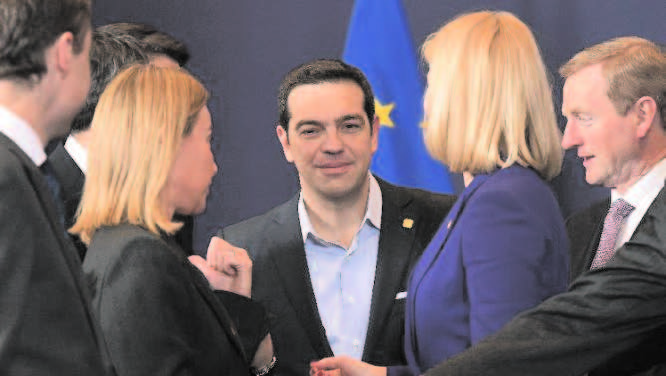
BRUSSELS (TIP): Greece‘s new Prime Minister Alexis Tsipras edged closer to securing a massive overhaul of its huge bailout on February 12 after making his case to sceptical EU leaders including German Chancellor Angela Merkel.
Tsipras, the leftist leader elected by austerity-weary Greeks last month, agreed that Athens would start technical talks with eurozone partners on Friday in a bid to find common ground before a last ditch meeting of finance ministers on Monday.
But with Greece facing a possible exit from the euro when its 240-billion-euro ($270-billion) EU-IMF bailout expires at the end of February, Tsipras kept talking tough during his first summit with the other 27 European Union leaders.
“Greece will not blackmail or be blackmailed,” Tsipras said in a press conference after the talks in Brussels.
He insisted that Greece would ditch the hated “troika” of creditors — the EU, IMF and European Central Bank — which oversees the bailout programme and carries out inspections to see that Greece is living up to its punishing reform commitments.
“Forget the programme, it no longer exists. The troika doesn’t exist either,” Tsipras said.
But he said that he discussed with his counterparts the possibility of a six-month bridging programme to give Greece time to work on a different programme that would be acceptable to its creditors, and “find an end to the crisis.”
– Merkel ‘amicable’ –
Germany has been the strongest opponent of Tsipras’s plans, adding to anger in Greece against Europe’s biggest economy, which many in Athens blame for imposing years of austerity since the country’s first bailout in 2010.
But Merkel suggested a “compromise” was possible and spoke of a “friendly” encounter with Tsipras in Brussels, during which they shook hands in front of the cameras.
“We greeted each other amicably, I congratulated him on his election,” said Merkel, fresh off the plane from Minsk where she helped broker a peace deal for the conflict in Ukraine.
“On my part I showed my willingness to cooperate. Now we have to see which points we can agree on.”
The more positive mood saw Greek shares surge over 6.0 percent while European stock markets rose and the euro was firmer against the dollar.
It was a far cry from the previous night in Brussels, when six hours of tense talks between Greek Finance Minister Yanis Varoufakis and his eurozone counterparts broke down acrimoniously without even agreeing on how to word a joint statement.
But on Thursday, Tsipras and Eurogroup head Jeroen Dijsselbloem agreed to renew efforts to “start work on a technical assessment of the common ground between the current programme and the Greek government’s plans,” a step that had nearly been agreed on Wednesday.
– ‘Optimistic’ Europeans –
Under the Greek proposals, Athens would stick to 70 percent of the programme but it would overhaul the remaining 30 percent which it sees as damaging to growth and toxic on issues including the new government’s plans to raise the minimum wage.
Athens also wants a bridging loan until September to buy time to hammer out a new reform and bailout package, and to offer debt swaps based on economic performance as the Greek economy moves out of recession.
Other European leaders said they were hopeful of a deal before Monday, likely the last chance for an agreement if it is to have time to be passed by eurozone parliaments.
“It’s my understanding that the discussions between Tsipras and Dijsselbloem were quite constructive and good,” Finnish Prime Minister Alexander Stubb, usually a strong advocate for austerity, told AFP.
“At the end of the day, no one should underestimate the capacity of the Eurogroup meeting to find a solution and I’m carefully optimistic that something will come out over the weekend.”
Grumbling continued however over the collapse of Wednesday’s talks, with European sources telling AFP there had originally been an agreement on a joint statement with the other ministers, but that it was torpedoed by Tsipras after his finance minister spent 30 minutes on the phone with him to confirm.
German Finance Minister Wolfgang Schaeuble had already left on the understanding the statement had been approved, they said.
Greek sources denied this account and said Germany had tried to insert new wording.





Be the first to comment